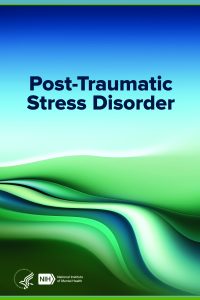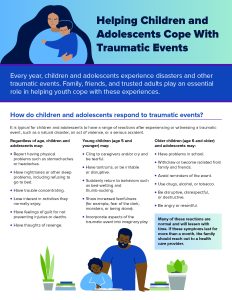Topic-Specific Resources Listed from A-Z
Traumatic Events
The following article on Anxiety Disorders is from the National Institute of Mental Health (NIMH). While this material has been expert-reviewed, it is not NIMH or MHANYS intention to provide specific medical advice. Both MHANYS and NIMH advise readers to consult with a qualified health care provider for diagnosis, treatment, and answers to personal questions.
Coping With Traumatic Events
How do people respond to traumatic events?
A traumatic event is a shocking, scary, or dangerous experience that can affect someone emotionally and physically. Traumatic events can include experiences such as natural disasters (such as hurricanes, earthquakes, and floods), acts of violence (such as assault, abuse, terror attacks, and mass shootings), and car crashes or other accidents.
It is natural to feel afraid during and after a traumatic situation. Fear is a part of the body’s “fight-or-flight” response, which helps us avoid or respond to potential danger. People may experience a range of reactions after trauma, including:
- Feeling anxious, sad, or angry
- Trouble concentrating and sleeping
- Continually thinking about what happened
Most people will recover from these symptoms, and their reactions will lessen over time. Those who continue to experience symptoms may be diagnosed with post-traumatic stress disorder (PTSD).
It is important to seek professional help if symptoms do not improve over time or begin to interfere with daily life. Some signs that a person may need help include:
- Worrying a lot or feeling very anxious, sad, or fearful
- Crying often
- Having trouble thinking clearly
- Having frightening thoughts or flashbacks, reliving the experience
- Feeling angry, resentful, or irritable
- Having nightmares or difficulty sleeping
- Avoiding places or people that bring back disturbing memories and responses
- Becoming isolated from family and friends
Physical responses to trauma may also mean that a person needs help. Physical symptoms may include:
- Having headaches
- Having stomach pain and digestive issues
- Having difficulty falling asleep or staying asleep
- Having a racing heart and sweating
- Being very jumpy and easily startled
People who have a personal or family history of mental illness or substance use, who have had previous exposure to traumatic experiences, who face ongoing stress or trauma (such as abuse), or who lack support from friends and family may be more likely to develop more severe symptoms and need additional help.
People who experience traumatic events also may experience panic disorder, depression, substance use, or suicidal thoughts. Treatment for these conditions can help with recovery after trauma.
If you or someone you know is struggling or having thoughts of suicide, call or text the 988 Suicide & Crisis Lifeline at 988 or chat at 988lifeline.org . In life-threatening situations, call 911.
How do children and teens react to trauma?
Children and teens can have extreme reactions to traumatic events, but their symptoms may not be the same as those seen in adults. In children younger than age 6, symptoms can include:
- Wetting the bed after having learned to use the toilet
- Forgetting how to talk or being unable to talk
- Acting out the scary event during playtime
- Being unusually clingy with a parent or other adult
Older children and teens usually show symptoms more like those seen in adults. They may also develop disruptive, disrespectful, or destructive behaviors. Older children and teens may feel guilt over not preventing injury or death. They may also have thoughts of revenge.
What can I do to cope after a traumatic event?
Healthy ways of coping can help reduce stress and improve well-being. Here are some things you can do to help yourself:
- Avoid the use of alcohol or drugs
- Spend time with trusted friends and relatives who are supportive
- Try to maintain routines for meals, exercise, and sleep
- Engage in exercise, mindfulness, or other activities that help reduce stress
- Set realistic goals and focus on what you can manage
How can I find help for coping with traumatic events?
If you’re not sure where to get help, a health care provider can refer you to a licensed mental health professional, such as a psychiatrist, psychologist, or clinical social worker with experience treating people who are coping with traumatic events.
In addition, the Disaster Distress Helpline from the Substance Abuse and Mental Health Services Administration (SAMHSA) provides crisis counseling and support to people experiencing emotional distress related to natural or human-caused disasters. The helpline is free, multilingual, confidential, and available 24 hours a day, 7 days a week.
SAMSHA also offers an online treatment locator to help you find mental health services in your area.
Federal resources
- Caring for Children in a Disaster : This webpage from the Centers for Disease Control and Prevention provides fact sheets, articles, and other tools and resources on caring for children in disasters or emergency situations.
- Disaster Preparedness, Response, and Recovery : This webpage from SAMHSA offers behavioral health resources for communities and responders that help them prepare, respond, and recover from disasters.
- Medications for PTSD : This webpage from the U.S. Department of Veterans Affairs describes effective medications for treating PTSD and considerations for evaluating treatment options.
- National Center for PTSD : Part of the U.S. Department of Veterans Affairs, this website has information and resources for anyone interested in PTSD, including veterans, family, friends, researchers, and health care providers. The site offers videos, apps, online programs, and other tools to help people with PTSD and their loved ones.
- PTSD (MedlinePlus – also en español )
- Publications on Disaster Preparedness and Recovery : This webpage from SAMHSA lists publications and digital products on coping after a disaster, pandemic, or traumatic event.
Handouts
 English/Español
English/Español  English / Español
English / Español
Mental Health Association in New York State (MHANYS) has additional resources that can be accessed through its main website. These resources include links to advocacy and policy work, school-based programs, mental health wellness training programs and more.
MHANYS
mhanys.org
Advocacy and Policy
mhanys.org/advocacy-policy
Mental Health Community Partners
mhcommunitypartners.org
CarePath™
mhanys.org/carepath
SMHRT: Family Education
https://www.mentalhealthednys.org/family-education-webinar-series/
Data Source
National Institute of Mental Health: Mental Health Information Health Topics www.nimh.nih.gov/health/topics
